动词的时态专题复习
- 格式:doc
- 大小:53.00 KB
- 文档页数:8
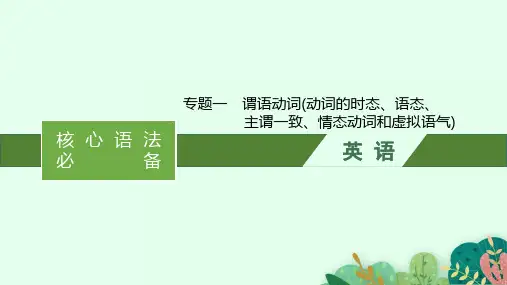
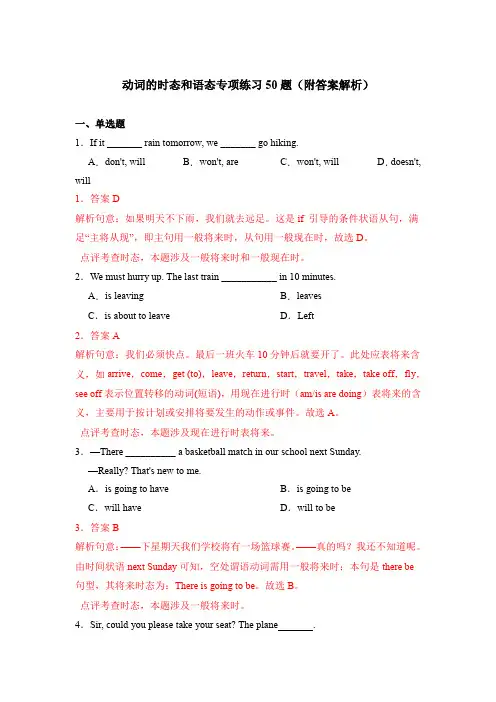
动词的时态和语态专项练习50题(附答案解析)一、单选题1.If it _______ rain tomorrow, we _______ go hiking.A.don't, will B.won't, are C.won't, will D.doesn't, will1.答案D解析句意:如果明天不下雨,我们就去远足。
这是if 引导的条件状语从句,满足“主将从现”,即主句用一般将来时,从句用一般现在时,故选D。
点评考查时态,本题涉及一般将来时和一般现在时。
2.We must hurry up. The last train ___________ in 10 minutes.A.is leaving B.leavesC.is about to leave D.Left2.答案A解析句意:我们必须快点。
最后一班火车10分钟后就要开了。
此处应表将来含义,如arrive,come,get (to),leave,return,start,travel,take,take off,fly,see off表示位置转移的动词(),用现在进行时(am/is are doing)表将来的含义,主要用于按计划或安排将要发生的动作或事件。
故选A。
点评考查时态,本题涉及现在进行时表将来。
3.—There __________ a basketball match in our school next Sunday.—Really? That's new to me.A.is going to have B.is going to beC.will have D.will to be3.答案B解析句意:——下星期天我们学校将有一场篮球赛。
——真的吗?我还不知道呢。
由时间状语next Sunday可知,空处谓语动词需用一般将来时;本句是there be句型,其将来时态为:There is going to be。
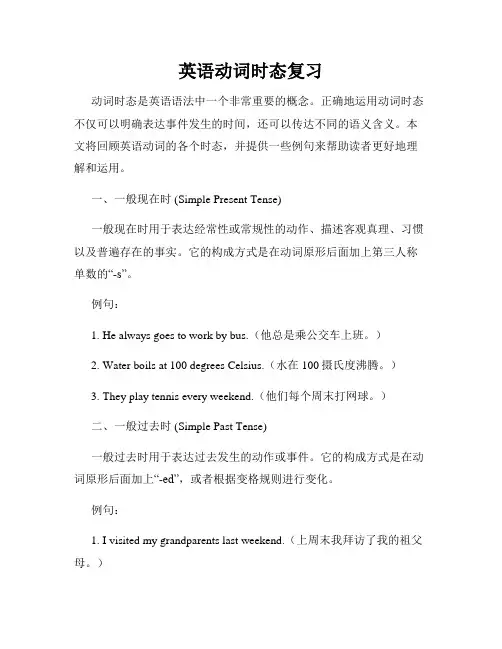
英语动词时态复习动词时态是英语语法中一个非常重要的概念。
正确地运用动词时态不仅可以明确表达事件发生的时间,还可以传达不同的语义含义。
本文将回顾英语动词的各个时态,并提供一些例句来帮助读者更好地理解和运用。
一、一般现在时 (Simple Present Tense)一般现在时用于表达经常性或常规性的动作、描述客观真理、习惯以及普遍存在的事实。
它的构成方式是在动词原形后面加上第三人称单数的“-s”。
例句:1. He always goes to work by bus.(他总是乘公交车上班。
)2. Water boils at 100 degrees Celsius.(水在100摄氏度沸腾。
)3. They play tennis every weekend.(他们每个周末打网球。
)二、一般过去时 (Simple Past Tense)一般过去时用于表达过去发生的动作或事件。
它的构成方式是在动词原形后面加上“-ed”,或者根据变格规则进行变化。
例句:1. I visited my grandparents last weekend.(上周末我拜访了我的祖父母。
)2. She studied English in high school.(她在高中学习英语。
)3. They played basketball yesterday.(他们昨天打篮球。
)三、一般将来时 (Simple Future Tense)一般将来时用于表达将来发生的动作或事件。
它的构成方式是在助动词“will”后面加上动词原形。
例句:1. We will have a party tomorrow.(我们明天将举办一个派对。
)2. He will travel to Europe next month.(他下个月将去欧洲旅行。
)3. They will meet at the park later.(他们一会儿在公园见面。
)四、现在进行时 (Present Continuous Tense)现在进行时用于表达现在正在进行或暂时性发生的动作。
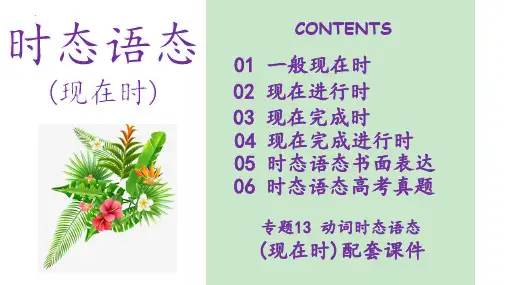
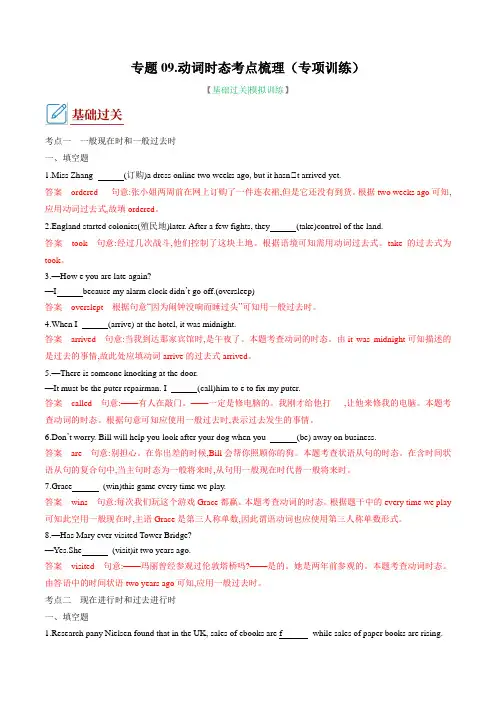
专题09.动词时态考点梳理(专项训练)【基础过关|模拟训练】考点一一般现在时和一般过去时一、填空题1.Miss Zhang (订购)a dress online two weeks ago, but it hasn t arrived yet.答案ordered 句意:张小姐两周前在网上订购了一件连衣裙,但是它还没有到货。
根据two weeks ago可知,应用动词过去式,故填ordered。
2.England started colonies(殖民地)later. After a few fights, they(take)control of the land.答案took句意:经过几次战斗,他们控制了这块土地。
根据语境可知需用动词过去式。
take的过去式为took。
3.—How e you are late again?—I because my alarm clock didn’t go off.(oversleep)答案overslept根据句意“因为闹钟没响而睡过头”可知用一般过去时。
4.When I (arrive) at the hotel, it was midnight.答案arrived句意:当我到达那家宾馆时,是午夜了。
本题考查动词的时态。
由it was midnight可知描述的是过去的事情,故此处应填动词arrive的过去式arrived。
5.—There is someone knocking at the door.—It must be the puter repairman. I (call)him to e to fix my puter.答案called句意:——有人在敲门。
——一定是修电脑的。
我刚才给他打,让他来修我的电脑。
本题考查动词的时态。
根据句意可知应使用一般过去时,表示过去发生的事情。
6.Don’t worry. Bill will help you look after your dog when you (be) away on business.答案are句意:别担心。

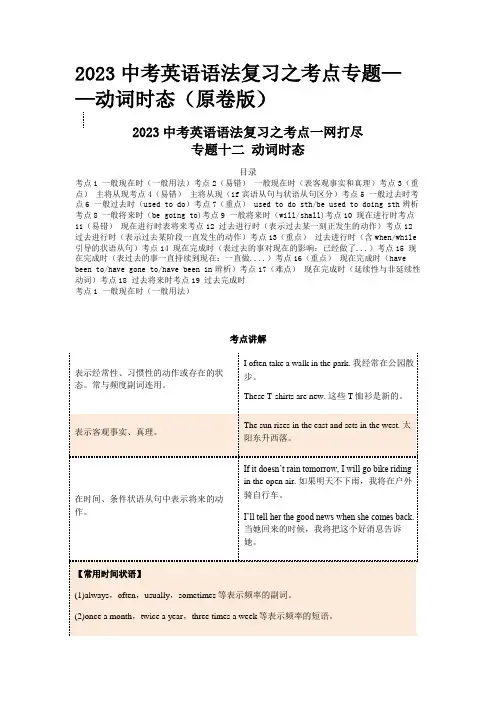
2023中考英语语法复习之考点专题——动词时态(原卷版)2023中考英语语法复习之考点一网打尽专题十二动词时态目录考点1 一般现在时(一般用法)考点2(易错)一般现在时(表客观事实和真理)考点3(重点)主将从现考点4(易错)主将从现(if宾语从句与状语从句区分)考点5 一般过去时考点6 一般过去时(used to do)考点7(重点) used to do sth/be used to doing sth辨析考点8 一般将来时(be going to)考点9 一般将来时(will/shall)考点10 现在进行时考点11(易错)现在进行时表将来考点12 过去进行时(表示过去某一刻正发生的动作)考点12 过去进行时(表示过去某阶段一直发生的动作)考点13(重点)过去进行时(含when/while 引导的状语从句)考点14 现在完成时(表过去的事对现在的影响:已经做了...)考点15 现在完成时(表过去的事一直持续到现在:一直做....)考点16(重点)现在完成时(have been to/have gone to/have been in辨析)考点17(难点)现在完成时(延续性与非延续性动词)考点18 过去将来时考点19 过去完成时考点1 一般现在时(一般用法)考点讲解1.(2021·上海松江·二模)Tim likes watching films. He _________ to the cinema with his girlfriend once a week.A.goes B.is going C.has gone D.will go2.(2020·湖北恩施)I hear that it often ________ in Sichuan and there are usually floods, especially in summer.A.rains B.rained C.will rain3.(2021·北京房山·二模)Mary ________ her grandparents every weekend.A.visits B.was visiting C.is visiting D.has visited4.(2021·广西桂林)The zebra eats grass, but it ________ eat meat.A.doesn’t B.didn’t C.don’t5.(2021·黑龙江·齐齐哈尔市碾子山区教师进修学校一模)—Do you like the flower? —Yes. It ________ sweet.A.is smelling B.smells C.smelt考点2(易错)一般现在时(表客观事实和真理)考点讲解精选练习6.(2020·天津红桥·二模)In the past, people didn't know the earth ________round the sun. A.going B.goes C.will go D.go7.(2021·吉林长春·模拟预测)The teacher told us that the sun ________ in the east. A.rises B.rise C.rose D.rising考点3(重点)主将从现考点讲解精选练习8.(2021·四川乐山)—What’s your plan for the summer holiday?—I’ll go to Chendu as soon as the school term ___________.A.end B.ends C.will end9.(2021·广西河池)Mrs. Green will take her son to the amusement park if she ________ the tickets.A.got B.gets C.is getting D.will get10.(2021·辽宁丹东)We can’t avoid traffic accidents unless everyone ________ the rules. A.follows B.breaks C.will follow D.will break考点4(易错)主将从现(if宾语从句与状语从句区分)考点讲解精选练习11.(2021·辽宁鞍山)—Tina wants to know if you ________ to the park with us tomorrow. —I’d love to. But if it ________, I may go to the library instead.A.go; will rain B.go; rains C.will go; rains D.will go; will rain12.(2020·黑龙江牡丹江)—I wonder if we ________a farewell party next week. —If we________it, I will call you.A.will have ; have B.have;will have C.will have; will have13.(2021·黑龙江哈尔滨)—I wonder if you ________ us for the English party tomorrow. —If I ________ free, I will go with you.A.will join, am B.will join, will be C.join, am考点5 一般过去时考点讲解精选练习14.(2021·广西贵港)—Where does Bill live? —He ________ me his address, but I can’t remember it now.A.tells B.told C.is telling D.will tell15.(2021·四川达州)— Alice has gone out. — Oh, has she? What time ________ she________?A.has; gone B.will; go C.did; go D.is; going16.(2021·江苏徐州)In my school days, I ________ a lot of reading in English every day. That was how I learned English at that time.A.do B.did C.have done D.will do17.(2021·重庆)Last Sunday my brother and I ________ our grandparents.A.will visit B.visits C.visit D.visited18.(2021·内蒙古兴安盟)— Have you ever been to Shanghai? — Of course. Actually, I________ there for six years, but now I live in Beijing.A.worked B.was working C.would work D.have worked考点6 一般过去时(used to do)考点讲解精选练习19.Mr Jiang isn’t as busy as before because there ___________no home robot to help him.A.used to be B.may be C.used to have D.may have20.I ________ in this small mountain village when I was a child.A.use to live B.used to living C.used to live D.used to life21.(2019·江苏镇江)Yao Ming, a basketball giant , ___________ water polo when he was young.A.is playing B.used to play C.is used to playing D.was playing考点7(重点) used to do sth/be used to doing sth辨析考点讲解精选练习22.(2020·湖南益阳)Diana used to _________ to work, but now she is used to ________ because the road is crowded and she wants to keep fit.A.drive; walk B.drive; walking C.driving; walk23.Dick __________ in America, but he has been ___________ Chinese food since he moved to China.A.used to live; used to eating B.is used to live; used to eat C.is used to live; used to eating D.used to living; used to eat24.—How does your brother go to school? —He ___________ ride a bike, but now he__________ there to keep fit.A.used to; is used to walk B.used to; is used for walking C.was used to; is used to walking D.used to; is used to walking考点8 一般将来时(be going to)考点讲解一般将来时表示将来某个时间要发生的动作,事情或存在的状态,也表示将来经常或反复发生的动作或事情。
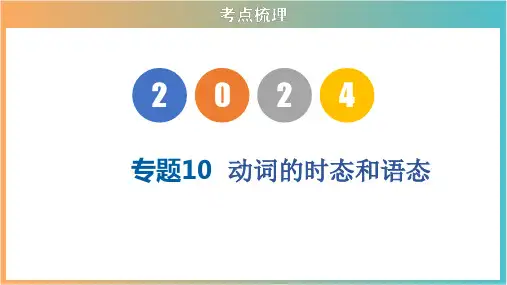
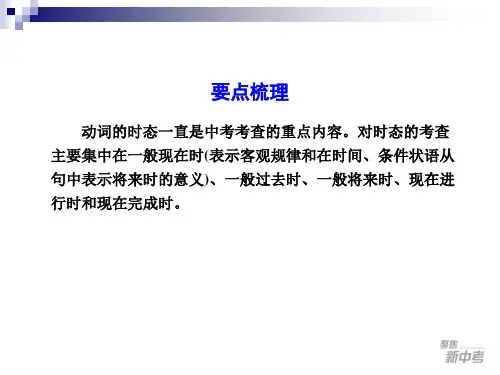
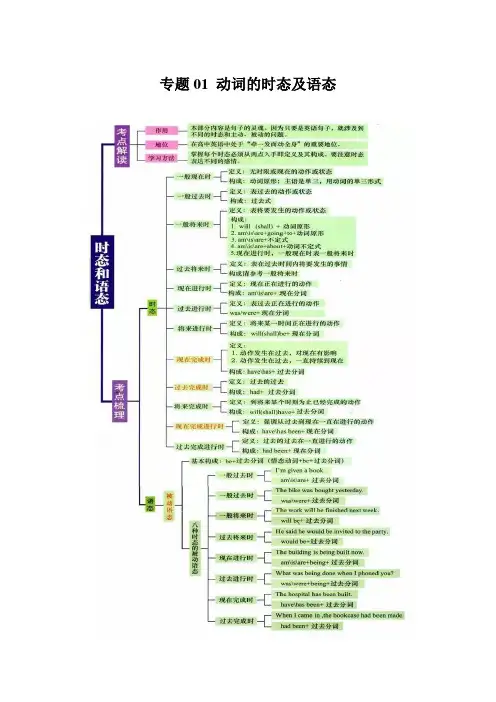
专题01 动词的时态及语态时态知识梳理重点用法1 一般现在时用法:1.be(am,is,are)动词的使用由主语的人称和数决定。
行为动词的第三人称单数加-s/es,其余人称用动词原形。
I am free tonight.我今晚有空。
The boy is ten years old.这个男孩10岁了。
They are students.他们是学生。
Bill often helps others.We like him a lot.比尔总是帮助他人。
我们很喜欢他。
2.表示经常、习惯性发生的动作或存在的状态。
It often rains in our city.我们的城市经常下雨。
3.表示普遍真理和客观真实。
The earth moves round the sun.地球围绕太阳转。
4.表示心理状态或情感的动词往往用一般现在时。
She hates rock music.她讨厌摇滚乐。
5.在时间、条件状语从句中表示将来的动作。
I will call on you as soon as I am free.我空闲时会去拜访你。
提示:一般现在时可以用来代替一般将来时,表示已经预先计划或安排的肯定将要发生的动作,句中常有表示将来时间的状语。
这一用法主要用于下列动词,如果arrive(到达),be (是),begin(开始),come(来到),go(去),leave(离开),reach(到达),start(出发)等。
The train leaves at eight o’clock.火车8点钟开车。
注意:一般现在时常用的时间状语有:today今天often经常always一直sometimes有时usually通常seldom很少on Sunday在星期天every day/week/morning每天/每周/每天早上重点用法2 一般过去时用法:1.be(was/were)动词的使用由主语的人称和数决定。
行为动词都要用过去式。
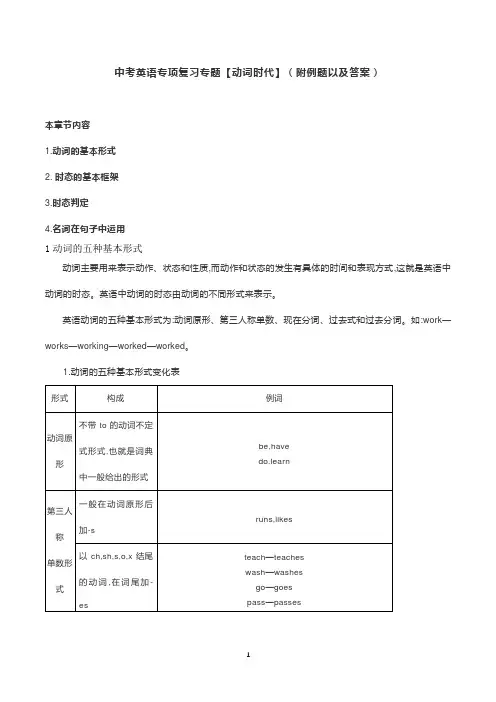
中考英语专项复习专题【动词时代】(附例题以及答案)本章节内容1.动词的基本形式2. 时态的基本框架3.时态判定4.名词在句子中运用1动词的五种基本形式动词主要用来表示动作、状态和性质,而动作和状态的发生有具体的时间和表现方式,这就是英语中动词的时态。
英语中动词的时态由动词的不同形式来表示。
英语动词的五种基本形式为:动词原形、第三人称单数、现在分词、过去式和过去分词。
如:work—works—working—worked—worked。
1.动词的五种基本形式变化表2时态的基本框架常见六种时态的构成及用法(1)一般现在时用法:①现在经常性的状态或动作;②客观事实和真理。
构成:①be+表语;②实义动词作谓语标志词:often, sometimes, usually, always, never,twice a month, every day/week/month/year(every系列)例句:He usually gets to school early.他通常很早到校。
The moon moves around the earth.月亮绕着地球转。
练一练1.认识从实践开始Knowledge practice.2.如果明天下雨,我们就不去公园了。
If it tomorrow,we to the park.【答案】1. begins with.2.rains,won’t go(2)一般过去时用法:表示过去的动作或状态。
构成:①was/were+表语;②实义动词作谓语标志词:a moment ago,just now,ago, yesterday, last night/week/month(last系列)例句:We went to Yunnan last Monday.上周一我们去了云南。
1.She (not visit)her aunt last weekend.2.My friend,Lucy, (study)for the math test and (practice)English last night. 【答案】1.didn’t visit 2.studied practiced(3)一般将来时用法:表示将来的动作或状态。
英语中考归纳复习专题:动词的时态【动词的时态】初中阶段学习的时态有以下八种:一般现在时、一般过去时、一般将来时、现在进行时、过去进行时、现在完成时、过去完成时、过去将来时.前六种为常考时态,要掌握各时态的构成、用法以及标志性时间状语.【一般现在时】【考点训练1】1.My father is a teacher and he _________ (teach) in a middle school.2.Yesterday the teacher told us the earth _______ (go) around the sun.3.—When shall we begin our meeting?—We’ll begin it when Helen ___ . ()esB.cameC.will comee4.—How do you usually go to school?—I usually ___ to school on foot. ()A.goB.wentC.was goingD.will go答案:teaches goes A A【一般过去时】要点提醒:“used to+动词原形”表示过去的习惯或状态.如:Mum used to tell us stories.妈妈过去常给我们讲故事.【考点训练2】1.Mike ________ (not go) to bed until 12 o’clock last night.2.He asked if I _____ (be) a student.3.Will you please say it again?I ___ quite ___ you.()A.don’t;hearB.didn’t;hearC.don’t;heardD.didn’t;heard4.He _____ go out with his parents,but now he ____ staying at home alone. ()ed to;is used toB.is used to;used toe to;is used toed to;used to答案:didn’t go was B A【一般将来时】要点提醒:be going to与will的区别1.be going to 指已计划好的事或思考过的意图、打算,will表示未事先思考或未计划而临时做出的决定.如:I’m going to see him tomorrow.我打算明天去看他.(事先经过思考)I’ll answer the door.我去开门.(未经事先考虑)2.be going to可表示客观迹象表明马上要发生的事,而will则表明说话者的主观意愿.如:Look at the clouds.There is going to be a storm.看看这些云,暴风雨就要来了.(客观迹象表明要发生)I hope it will be warm tomorrow.我希望明天会暖和起来.(主观意愿)3.在含有条件状语从句的复合句的主句中,一般用will,不用be going to. 如:I will come if it doesn’t rain.如果不下雨的话,我就来.【考点训练3】1.____ a concert in our school next Saturday. ()A.There isB.There areC.There will beD.There will have2.If they can arrive by 9:00 am,we ___ a meeting.()A.haveB.will haveC.hadD.would have3.He ___ her a beautiful hat on her next birthday.()A.givesB.gaveC.will givingD.is going to give答案:C B D 【现在进行时】【考点训练4】1.They ____________ (have) a math test in the classroom now.2.Look! He ___________ (lie) on the beach.3.—Pass the raincoat to me.It ___ hard now.—Here you are. ()A.rainB.is rainingC.rainedD.will rain4.—Cathy,can you answer the door?I ___ the room.—I’m coming,Mum. ()A.CleanB.cleanedC.have cleanedD.am cleaning答案:are having is lying B D【过去进行时】He was forever com plaining about something.他老是怨这怨那.要点提醒:1.在含有时间状语从句的复合句中,延续时间较长的动作常用过去进行时,另一个短暂性动作用一般过去时.如:When the UFO landed,I was shopping at the clothes store.当UFO落地时,我正在服装店买衣服.2.表示两个延续性动作在过去某一时刻同时进行,不考虑动作的先后顺序,主句和从句的谓语动词都用过去进行时,连词常用while.如:Tom was doing his homework while I was reading a newspaper.我在看报纸时,汤姆在做作业.【考点训练5】1.Mike and I ___________ (play) basketball at that time yesterday afternoon.2.While Mr.Johnson _______________ (work) in the office,the phone rang.3.The girl ___ for the bus when the rainstorm came.()A.waitedB.have waitedC.is waitingD.was waiting4.—Jenny,I called you at nine last night,but you didn’t pick up.—Oh,I ____ a popular program called Go Fighting!.()A.watchB.watchedC.was watchingD.am watching答案:were playing was working D C【现在完成时】要点提醒:1.have/has been to,have/has gone to与have/has been in(考点讲解详见P74考点1)2.延续性动词与非延续性动词英语中的动词按动作发生的方式、发生过程的长短可分为延续性动词和非延续性动词两种,非延续性动词也可称为短暂性动词或瞬间动词.在现在完成时态中,有时要将非延续性动词转换为延续性动词,这样才能和时间段连用.转换方法如下:(1)将短暂性动词转换为“be+形容词或副词”.请看下表:如:这间商店开门6小时了.The shop has opened for 6 hours.( ×)The shop has been open for 6 hours.( √)(2)有的短暂性动词可以转换为意思相同的延续性动词.请看下表:如:这本书我借了一个月了.I have borrowed the book for one month.( ×)I have kept the book for one month.( √)3.现在完成时与一般过去时的区别现在完成时强调某一动作或状态对现在造成的影响或结果,不能和表示过去的时间状语连用;一般过去时只表示过去的事实,不表示和现在的关系,可以和表示过去的时间状语连用.如I bought a ticket yesterday.我昨天买了一张票.(强调我昨天做的一件事是买票)I have already bought a ticket.我已经买了一张票.(强调我已经有票了,无须再惦记票的事了)4.现在完成时的其他句型【考点训练6】1.—you _____ your homework yet?—Yes.I ______ it a moment ago. ()A.Did;do;finishedB.Have;done;finishedC.Have;done;have finishedD.Will;do;finish2.His father ___ the Party since 1978. ()A.joinedB.has joinedC.was inD.has been in3.Miss Green isn’t in the office.She to the library. ()A.has goneB.wentC.will goD.has been 答案:B D A【过去完成时】had + 过去分词表示在过去的过去发生的动作或存在的状态.I had had three pieces of cake when you arrived.你来的时候我已经吃了三块蛋糕了.表示过去某一动作或状态持续到过去另一时间.The old man had lived in Shanghai for ten years beforeTom came here.汤姆来这儿之前,这个老人已经住在上海十年了.时间标志by the time...,before,when等构成的短语或引导的从句【考点训练7】1.在我们到达电影院之前,电影已经开始了.The film __________ before we _______ to the cinema.2.警察赶到时,小偷已经逃跑了.When the police __________,the thief____________________ .答案:had begun got arrived had run away 【过去将来时】【考点训练8】1.李明说如果布莱恩下个月来中国,他将会很高兴.Li Ming said he ___________ happy if Brian came to China the next month.2.蒂娜说她下周三打算来参加我的生日派对.Tina said she ________________ my birthday party the next Wednesday.答案:would be was going to【中考示例】(2017·广西)If he _____ Guilin,he’ll probably go to Yangshuo. ( )A.visitsB.is visitingC.will visitD.has visited【解析】考查动词的时态.句意:如果他游览桂林,他有可能会去阳朔.if引导条件状语从句时,时态遵循“主将从现”原则,从句中用一般现在时表示将来.【考题热身】1.(2017·甘肃)I promise I ________ (send) you an email to explain all of these tomorrow.2.(2017·甘肃)Be quiet! The patients ______________(sleep).3.(2017·鄂州)Sandy’s grandparents__________________ (marry) for 50 years.4.(2017·台州改编)A true friend always ____________(support) you whenever youare in trouble.5.(2017·宿迁)I ______________(wash) the dishes while my sister was sweeping the floor.6.(2017·云南)—What do you think of your hometown, Kate?—It a lot.It’s more beautiful than before. ()A.has changedB.changesC.will changeD.change7.(2017·武汉)—Linda is not coming for the party tonight.—But she ______!()A.promisesB.promisedC.will promiseD.had promised8.(2017·毕节)It’s nice to see you again.We ___ each other since 2016. ()A.won’t seeB.haven’t seenC.don’t seeD.didn’t see9.(2017·黔东南)If it doesn’t rain this weekend,we ___ a picnic in the Jinquan Park. ()A.haveB.will haveC.have hadD.had10.(2017·上海)Some exchange students ___ with their host families this time yesterday. ()A.are chattingB.will chatC.were chattingD.have chatted11.(2017·重庆B卷)—Where is your uncle?I haven’t seen him for a long time. —He _____ Beijing for about half a year.He moved there in January. ()A.has gone to B.has been toC.has arrived inD.has been in12.(2017·重庆B卷)John and I ___ to visit his grandparents last Sunday afternoon. ()A.goB.wentC.will goD.have gone13.(2017·重庆A卷)In the past few years,many schools ____ the ways of doing morning exercises. ()A.changeB.changesC.will changeD.have changed14.(2017·重庆A卷)As soon as the rain _____ ,they will go out to pick apples. ()A.stopsB.stoppedC.will stopD.is stopping15.(2017·河北)Don’t take the dictionary away.I ___ it. ()eedC.am usingD.have used答案:will send are sleeping have been married supports A B BBCDBDAC。
动词的时态专题复习一、考点测试( ) 1. One morning while I ______ along the street, I _____ an old man crying.A. am walking, heardB. walked, heardC. was walking, heardD. walk, hear( ) 2. The stranger told us his name after we ______ him twice.A. askedB. have askedC. were askingD. will ask( ) 3. Ms. Smith ______ in New York in the spring of 1998. A. has been B. will be C. were D. was( ) 4. The Whites ______ Paris and will stay there for one year.A. have gone toB. have been toC. go toD. were going to( ) 5. Be sure to let Tom know the notice as soon as he ______.A. will arriveB. was arrivingC. arrivesD. arrived( ) 6. –Has your father finished his report? –Sorry, I don’t know. He _____ it all the time th is morning.A. was writingB. wroteC. has writtenD. writes( ) 7. They ______ her to the party, so she was very happy.A. inviteB. invitedC. will inviteD. are inviting( ) 8. If I find his phone number, I _____ you. A. tell B. told C. will tell D. have told( ) 9. –Why are you in such a hurry, Mike? –There _____ an NBA basketball game in ten minutes.A. will haveB. will beC. wasD. is( ) 10. Mr. Green _____ to the manager now. You’d better call him later.A. talk B. talked C. is talking D. was talking ( ) 11. –Where are Mr. and Mrs. White? –They ________ TV in the sitting room at the moment.A. are watchingB. have watchedC. watchedD. watch( ) 12. –When did you ______ the new bike? –Well, I _________ it for half a month.A. had, have boughtB. buy, have hadC. buy, have boughtD. bought, bought( ) 13. I ___________ to Cape Town, so I know nothing about it.A. don’t travelB. won’t travelC. haven’t traveledD. have traveled( ) 14. Listen! They ___ about Harry Potter. Let’s join them. A. are talking B. talk C. have talked D. talked( ) 15. –Why not go to see the dolphin show with me? –Because I ________it.A. sawB. will seeC. seeD. have seen二、考点精讲精练考点1:一般现在时:(1).句型结构You are a good worker. →You are not a good worker. (否定句,在is, am, are 后加not)→Are you a good worker? (一般疑问句,把is, am, are 提句首)→Yes, I am. / No, I am not. (回答)He usually goes to school at seven.→He usually doesn’t go to school at seven. (否定句,第三人称单数在动词前+doesn’t;其他人称+don’t)→Does he usually go to school at seven? (一般疑问句,第三人称单数在句首+Does;其他人称+Do)→Yes, he does. / No, he doesn’t. (回答)(2). 用法:①.表动作经常发生或现在存在的状态。
英语动词的时态题20套(带答案)一、初中英语动词的时态1.This medicine millions of people,s lives since it was put into use.A. is savingB. will saveC. has savedD. had saved【答案】C【解析】句意:这种药物自从投入使用以来已经挽救了数百万人的生命。
since后跟从句,表示“自……以来〃,说明的是现在的状况,判断用现在完成时态,故答案为C。
2.—Where,s your father, Tom?—He newspaper in the study.A.readsB.readC.is readingD.has read【答案】C【解析】句意:--汤姆,你爸爸在哪里?--他在书房里读报纸。
根据问句"汤姆,你爸爸在哪里?〃,判断答语的句意是“他正在书房里读报纸。
〃即设空处的动作在说话时刻正在进行着,所以句子用现在进行时,现在进行时的构成:am/is/are+动词的现在分词,故答案为C。
3.You can ring me this evening. I at home.A.stayB.stayedC.will stayD.have stayed【答案】C【解析】【详解】句意:今天晚上你可以给我打电话,我会待在家里。
stay待在,停留,一般现在时态的结构;stayed是过去式形式;will stay 一般将来时态;have stayed现在完成时。
根据句意可知,这里说的是this evening,是一个将来的时间,故用一般将来时态,选C。
4.you my watch? Yes, I it on the table just now.A. Did , see , sawB. Did , see , seeC. Have , seen, saw.D. Have , seen, have seen【答案】C【解析】句意:一一你看见我的手表了吗?一一是的,我刚才在桌子上看到了。
动词的各种时态归纳一、一般现在时构成:主语+谓语(主谓一致,需注意主语为单三时,谓语动词用单三) 时间状语:常与表示频率的时间状语连用,如usually, often, always, sometimes,never, every day, once a week 等.用法:⑴表示经常发生或习惯性的动作或状态.eg: He always goes to work by subway.他总是乘地铁去上班.I visit my grandmother once a week.我一周去看望一次我的祖母.Mary does exercise every day.玛丽每天做运动.(2)表示客观事实或普遍真理,也用在格言中.eg: Light travels faster than sound.光比声音传播的快.Pride goes before a fall.骄傲使人失败.⑶表示按方案或时间表将要发生的事儿,其后常跟表示将来的时间状语. The plane takes off at four PM.飞机下午4点起飞.When does the school begin?学校什么时候开学?(4)表示主语现在的特征性格或状态.Jenny loves music.珍妮喜欢音乐.She lives in a small apartment.他住在一套小公寓里.(5)一些表示心理意识的动词,如know, understand, remember等无进行时,只能用一般现在时表示现在发生的具体行为.eg: I still remember the frightening experience on the island.我仍然记得在那个岛上的可怕经历.⑹在时间和条件状语从句中代替一般将来时.eg: I'll think about it when I write my report.我写报告时会对此予以考虑的.If he comes, I'll let you know as soon as possible.如果他来的话,我会尽快让你知道.二、现在进行时构成:主iu+be+doing时间状语:常与now, right now, at present, at the moment 等时间状语及look, listen等标志词连用.用法:⑴表示说话时正在进行的动作.eg: We are waiting for the subway at the moment.我们现在正在等地铁.Listen! Somebody is singing.听!有人在唱歌.⑵表示现阶段正在进行,而此刻不一定在进行的动作.成语表示一段时间的状语连用,如these days, this week等.eg: How are you getting on with your classmates these days?这些天你和同班同学相处的如何?We are studying French this semester.我们这学期学习语法.⑶某些非延续性动词可以用现在进行时表示即将发生的动作.常用的这类动词有come, go, leave, arrive, start, finish, die 等.这时剧中一般有表示将来的时间状语.eg: They are living by train tonight.他们今晚坐火车走.We are starting work at 8 o'clock next month.下个月我们将8点开始上班.(4)表达特定的感情色彩.现在进行时常与always, continually, constantly, forever等表示频率的副词连用,表示重复的动作,常含有厌烦,不满,抱怨,赞扬等感情色彩.试比拟:She is always scolding her child.她总是训斥自己的孩子.〔不满〕She always scolds her children.他总是训斥自己的孩子.〔事实〕He is constantly doing good work at school.他在学校总是成绩优秀.〔赞扬〕He does good work at school.他在学校成绩优秀.〔事实〕三、现在完成时构成:主语+ha ve/has+done标志词:常与already, just, yet, before, recently, so far, ever, never, once 等连用.用法:⑴表示过去发生的动作,对现在造成的影响或结果.eg: They have already learned two languages.他们己经学会了两种语言.He hasn't made a remark on the structure yet.他尚未对该结构发表评论.I have seen the linguist only once this year.我今年只见过那位语言学家一次.⑵表示从过去某一时间开始持续到现在的动作或状态.常与表示一段时间的状语连用,如so far, up to now, for a long time, for years, since 2021, in the past/ last five years, these days 等. eg: Tom and mary have been friends for years.汤姆和玛丽是多年的朋友.He has lived in London since 2000.自从2000年以来他就住在伦敦.How many words have you learned these days?这些天你学会了多少单词?⑶在时间和条件状语从句中代替将来完成时.eg: I will go to the party as soon as I have finished my homework.我一完成作业就去参加聚会.I will not believe you unless I have seen it with my own eyes.除非亲眼看到,否那么我是不会相信你的.(4)在This/ It is the first /second time that 句式中,that 从句用现在完成时. eg: It's the first time that I have come to Harvard University.这是我第1次来哈佛大学.四、一般过去时构成:主语+动词过去式时间状语:yesterday, last..., ...ago, in+过去年份等.用法:(1)表示过去某个特定时间发生的动作或存在的状态.eg: He offered his seat to an old man.他把他的座位让给了一位老人.He had a nice encounter with that girl last week.上周我与那个女孩有一次美丽的邂逅.⑵表示过去某一段时间内经常性或习惯性的动作.eg: When I was a teenager, I played table tennis almost every day.我十几岁时几乎每天都打乒乓球.⑶在时间和条件状语从句中代替过去将来时.eg: They said they would let us know if they heard any news about him.他们说如果听到关于他的任何消息,他们就会通知我们.五、一般将来时构成:主语+shall/will+动词原形时间状语:常与tomorrow, next week, in the future, in a few days等时间状语连用.用法:表示将要发生的动作或存在的状态.eg: I shall leave for London tomorrow.我明天要去伦敦.A simple test will show if this is real gold.一个简单的测试将会证实这是不是真金.其他表达方式:(1)be going to do表示打算方案安排要做某事,或有迹象说明要发生某事.eg: What are you going to do during the summer holiday?暑假你打算做什么?Look at the dark clouds! It's going to rain.瞧那些乌云!就要下雨了.(2)be about to do表示即将发生的动作,一般不与具体的时间状语连用.eg: Be quiet! The lecture is about to start.安静!讲座马上就要开始了.⑶ be to do表示根据约定责任义务或要求等即将发生的动作. eg: We are to meet at the school gate.我们约好在校门口见.。